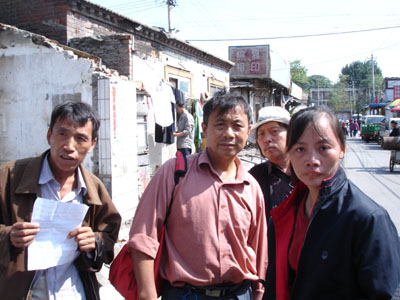 In perhaps one of their more unorthodox interview situations, the Associated Press interviewed petitioner and protester Zheng Dajing from inside one of China’s increasingly infamous “black jails.” Zheng was only partially visible from behind a thick plastic sheet and confirmed his identity by reciting his wife’s cell number. Zheng was jailed for organizing protests associated with “Legal Publicity Day,” meant to promote the Chinese legal system.
In perhaps one of their more unorthodox interview situations, the Associated Press interviewed petitioner and protester Zheng Dajing from inside one of China’s increasingly infamous “black jails.” Zheng was only partially visible from behind a thick plastic sheet and confirmed his identity by reciting his wife’s cell number. Zheng was jailed for organizing protests associated with “Legal Publicity Day,” meant to promote the Chinese legal system.
While protesters in the U.S. petition with relative ease - for everything from tax reform to protecting the livelihood of certain small animals - in China, petitioning the government can be met with an immense amount of graft and even jail.
Despite the current political atmosphere, where complaints can land one in a "black jail," China has a historical legacy of petitioning. Petitioning in its current form began during the Ming dynasty (1300 AD). At that time, it was used as a means for citizens to complain about corrupt local officials (sound familiar?) to the Imperial government.
Reports of the increasing prevalence of “black jails” are cause for concern. Recently, the Communist Party’s state run magazine ran an expose on the subject of these jails, particularly their profitable nature. Local officials pay black jail guards to keep petitioners in jail. Their incentive? To keep the number of people filing grievances against them low and giving citizens no recourse. If ever there were a need for strong legal reform in China to protect citizen’s rights, it would be now.